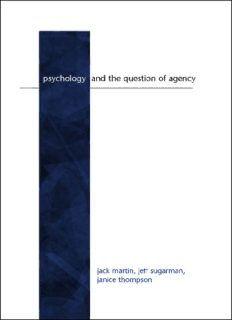
Psychology and the Question of Agency PDF
Preview Psychology and the Question of Agency
PSYCHOLOGY and the question of AGENCY SUNY series, ALTERNATIVES IN PSYCHOLOGY Michael A. Wallach, editor Q P S Y C H O L O G Y and the question of A G E N C Y Jack Martin, Jeff Sugarman, Janice Thompson STATE UNIVERSITY OF NEW YORK PRESS Merleau-Ponty, and Levinas Published by STATE UNIVERSITY OF NEW YORK PRESS, ALBANY © 2003 State University of New York All rights reserved Printed in the United States of America No part of this book may be used or reproduced in any manner whatsoever without written permission. No part of this book may be stored in a retrieval system or transmitted in any form or by any means including electronic, electrostatic, magnetic tape, mechanical, photocopying, recording, or otherwise without the prior permission in writing of the publisher. For information, address State University of New York Press 90 State Street, Suite 700, Albany, NY 12207 Production, Laurie Searl Marketing, Fran Keneston Library of Congress Cataloging-in-Publication Data Martin, Jack, 1950– Psychology and the question of agency / Jack Martin, Jeff Sugarman, and Janice Thompson. p. cm. — (SUNY series, alternatives in psychology) Includes bibliographical references and index. ISBN 0-7914-5725-7 (alk. paper) — ISBN 0-7914-5726-5 (pbk. : alk. paper) 1. Autonomy (Psychology) I. Sugarman, Jeff, 1955– II. Thompson, Janice, 1964– III. Title. IV. Series. BF575.A88 M37 2003 155.2—dc21 2002075854 10 9 8 7 6 5 4 3 2 1 Contents Preface ix ONE PSYCHOLOGY AND THE QUESTION OF AGENCY 1 Some Relevant Background for ` What Follows 3 Psychology’s Disavowal of Agency 8 The Basic Error 10 Method over Substance 12 Aspirations 14 TWO REDUCTIONISM IN PSYCHOLOGY 17 A Historical Sketch 18 Identity versus Requirement 20 Omissions 21 Summary and Implications 24 Research Practices and the Construction of Pseudo-Psychological Kinds 25 Causal Woes 28 Variability and Its Statistical Treatment 29 Manufacturing and Generalizing Psychological Entities 31 The Role of Professional Psychology 33 The Example of Self-Concept 35 Another Kind of Reductionism in Psychology 39 An Antidote in Brief 44 vi Psychology and the Question of Agency THREE BETWEEN HARD DETERMINISM AND RADICAL FREEDOM 45 Definitions and Distinctions 46 A Critical Consideration of Some Notable Attempts at Soft Determinism 49 Philosophical Considerations 50 Psychological Considerations 58 Bandura’s Social Cognitive Theory 59 Theory of Mind and Intentional Self-Development 63 Theoretical Psychology of Agency 67 Hermeneutics and Agency 73 FOUR THE UNDERDETERMINATION AND IRREDUCIBILITY OF AGENCY 81 An Argument for the Underdetermination of Agency 82 Structure of the Argument 83 Against Full Physical–Biological Determinism 84 Against Full Sociocultural Determinism 84 Against Randomness and Unconscious Processes Alone 86 Agency as the Surviving, Plausible Option 88 Contemporary Programs of Reductionism and the Irreducibility of Agency 90 Central State Materialism 91 Supervenience and Functionalism 93 Computational Models of Mind 96 What Is Missing in Reductive Functionalism and Computationalism? 98 Summary and Links 100 FIVE A THEORY OF SITUATED, EMERGENT, AND DELIBERATIVE AGENCY 103 Levels of Reality 104 Being-in-the-World 104 Tiered Reality 106 Psychology and the Question of Agency vii An Existential Starting Point and a Brief Conception of Personhood 110 The Developmental Emergence of Situated, Deliberative Agency and Psychological Kinds 112 Understanding and Care within Traditions of Living 117 Summarizing Our Theory of Agency and Psychological Kinds 123 Implications for Understanding Psychological Phenomena 126 A Final Word 129 SIX PUTTING AGENCY INTO PSYCHOLOGY 133 Re-envisioning Psychological Research: Reinforcement Theory and Beyond 135 Reinforcement Theory Revisited 135 Beyond Reinforcement Theory 139 Re-envisioning Psychological Practice 141 The Nature of Psychotherapy 143 The Practice of Psychotherapy 148 The Education of Psychotherapists 151 The Sociopolitical Consequences of Situated, Emergent, and Deliberative Agency 154 Liberalism and Communitarianism 155 The Political Disposition of a Situated, Emergent, and Deliberative Agency 159 A Concluding Comment 165 References 167 Index 175 Preface Most contemporary persons believe in both science and their own ability to direct their lives, a joint commitment reflected and encouraged by disciplin- ary and professional psychology. Nonetheless, it is by no means clear that such a commitment can be coherently maintained. While the determinism of science might fit well with the inevitability of death and taxes, it seems decidedly at odds with much of our everyday experience of ourselves as agents capable of choice and action that make a difference in our lives. On the other hand, a certain amount of order and predictability in our physical and social world seem necessary if we are to exercise any control over our circumstances. After all, chaos hardly seems conducive to self-determination. In this volume, we argue for a kind of agency that is both determined and determining and strongly recommend that both disciplinary and profes- sional psychology embrace such a conception as central to their inquiries and practices. In fact, we go so far as to suggest that it is precisely because mainstream psychology has not developed an adequate conceptualization and theory of human agency that it has fallen prey to an overly reduction- istic scientism that has failed to draw necessary distinctions between natural and human phenomena. More particularly, most scientific and professional psychology has failed to provide an adequate account of self-determination as emergent from, yet irreducible to, its sociocultural constituents and physi- cal–biological requirements. We maintain that such an account is exactly what is required for a coherent conception of human agents as both deter- mined and determining, in a manner that fits both our everyday experience of ourselves and acceptably rigorous forms of psychological inquiry and practice. The purpose of our book is to argue for and theoretically elaborate this position. Readers familiar with the philosophical canon will realize that the conceptualization of agency with which we will be concerned is a form of compatibilism. However, it is a kind of compatibilism that goes beyond voluntarism alone to allow for a modest kind of origination. In other words, our agency is not restricted to the kind of thing that the Stoic philosopher ix
Description: